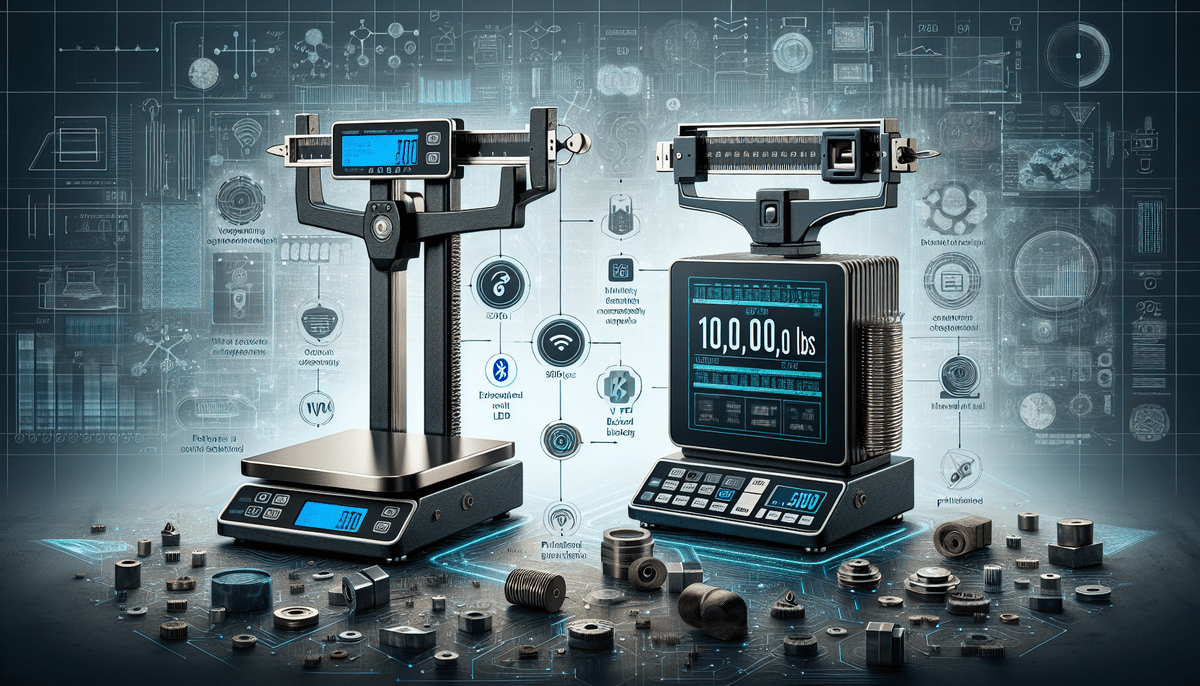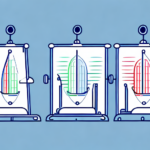Cardinal Scale vs CAS RW-L Series: A Comprehensive Comparison
When selecting weighing equipment for your business, Cardinal Scale and the CAS RW-L Series stand out as reputable brands. Both offer precise and dependable weighing solutions, making it essential to understand their differences to choose the best fit for your needs. This article delves into their features, accuracy, capacities, design, cost-effectiveness, customer feedback, applications, troubleshooting, and more to guide your decision.
Key Features of Cardinal Scale and CAS RW-L Series
Display Technology
An essential aspect of any scale is its display. Cardinal Scale models come equipped with an easy-to-read LCD display, ensuring clarity during operations. In contrast, the CAS RW-L Series features a VFD display with a backlight, enhancing visibility in low-light environments. Additionally, the CAS RW-L Series integrates a built-in printer capable of producing labels with barcodes and essential information, adding to its functionality.
Connectivity Options
Both scales support RS-232 and USB connections for seamless data transfer. However, the CAS RW-L Series distinguishes itself by offering Bluetooth connectivity, facilitating wireless connections with other devices such as printers and computers. Both scales also feature a tare function, allowing users to weigh items without including the container's weight.
Weighing Capacity
Weighing capacity is a critical consideration. The Cardinal Scale boasts a maximum capacity of 10,000 pounds, making it suitable for handling larger items. On the other hand, the CAS RW-L Series can manage up to 5,000 pounds, which is adequate for most commercial applications. This higher capacity makes Cardinal Scale an ideal choice for businesses dealing with bulkier loads.
Accuracy Comparison: Cardinal Scale vs CAS RW-L Series
Calibration Requirements
Accuracy is paramount in weighing equipment, especially for businesses that sell products by weight. Both Cardinal Scale and the CAS RW-L Series claim high accuracy levels. The Cardinal Scale recommends annual calibration to maintain precision, while the CAS RW-L Series advises calibration after a specific number of weighings or a set time interval, whichever occurs first.
Environmental Factors
Environmental conditions such as temperature and humidity can impact scale accuracy. It is advisable to operate both scales in stable environments to ensure reliable readings. According to the National Institute of Standards and Technology (NIST), maintaining consistent environmental conditions is essential for accurate measurements.
Capacity and Accuracy
The Cardinal Scale’s higher maximum capacity of 10,000 pounds allows for more accurate measurements of larger or bulk loads compared to the CAS RW-L Series, which supports up to 5,000 pounds. Additionally, the Cardinal Scale's advanced connectivity options facilitate data recording and analysis, enhancing overall accuracy and utility in business operations.
Weighing Capacities: Detailed Insights
Cardinal Scale Capacities
The Cardinal Scale offers models with capacities up to 10,000 pounds, catering to industries such as manufacturing, logistics, and heavy machinery handling. This high capacity is crucial for businesses that require precise measurements of large or heavy items.
CAS RW-L Series Capacities
Conversely, the CAS RW-L Series has a maximum capacity of 5,000 pounds, which is sufficient for most commercial settings like retail stores, bakeries, and small-scale manufacturing. This makes the CAS RW-L Series versatile for various business environments.
Additional Considerations
Beyond capacity, factors such as durability, accuracy, and ease of use are vital in selecting the right scale. For instance, environments exposed to moisture or dust may benefit from scales with waterproof or dustproof features to ensure longevity and consistent performance.
Design Differences Between Cardinal Scale and CAS RW-L Series
Build Quality
Both Cardinal Scale and the CAS RW-L Series feature robust stainless steel constructions suitable for commercial use. However, Cardinal Scale offers a broader range of designs, including floor and bench scales, providing more options to fit various business environments and spatial constraints.
Display Features
A notable design difference lies in the display screens. Cardinal Scale models typically feature larger, backlit displays that offer superior visibility in dim settings. In contrast, the CAS RW-L Series has smaller displays, which might be less visible under certain lighting conditions but are complemented by their backlit VFD technology.
Pros and Cons: Cardinal Scale vs CAS RW-L Series
Advantages of Cardinal Scale
- High weighing capacity up to 10,000 pounds
- Diverse models tailored for various applications
- Durable and reliable construction
- Annual calibration ensures consistent accuracy
Disadvantages of Cardinal Scale
- Higher initial investment
- Customer service may experience longer response times
Advantages of CAS RW-L Series
- Built-in printer for efficient labeling
- VFD display with backlight enhances visibility
- Bluetooth connectivity for wireless data transfer
- Compact and portable design suitable for diverse locations
Disadvantages of CAS RW-L Series
- Limited weighing capacity of up to 5,000 pounds
- Complex user interface may pose challenges for some users
- Higher maintenance and repair costs
Customer Reviews and Feedback
Cardinal Scale User Experiences
Users of Cardinal Scale commend its high accuracy, ease of operation, and robust build quality. Many highlight its reliability in high-demand environments. However, some users have noted slower customer service response times as a drawback.
CAS RW-L Series User Experiences
Owners of the CAS RW-L Series appreciate the built-in printer, Bluetooth functionality, and overall user-friendly design. Nevertheless, a few users have pointed out the limited weighing capacity and occasional print quality issues as areas needing improvement.
Price Considerations
The Cardinal Scale is generally priced higher than the CAS RW-L Series, which may influence purchasing decisions for budget-conscious businesses. However, the Cardinal Scale's reputation for reliability and accuracy often justifies the higher cost, providing long-term value.
Cost-Effectiveness: Analyzing Value
Initial Investment vs Long-Term Value
While the Cardinal Scale models come at a higher initial price point due to their advanced features and higher capacity, the CAS RW-L Series is more affordable, typically ranging between $300 to $500. However, cost-effectiveness should consider durability, accuracy, and maintenance costs. The Cardinal Scale’s robust build and precise measurements can reduce the need for frequent repairs and replacements, potentially offering better long-term value.
Maintenance and Support Costs
Cardinal Scale provides comprehensive customer support and maintenance services, which can lower the total cost of ownership by minimizing downtime and ensuring the scale remains in optimal condition. In contrast, the CAS RW-L Series may incur higher maintenance and repair costs over time, especially if frequent recalibrations or part replacements are necessary.
Choosing the Right Scale for Your Business
Assessing Business Needs
Selecting the appropriate weighing equipment involves evaluating factors like weighing capacity, design, features, accuracy, and budget. Consider the specific applications your business requires. For instance, the Cardinal Scale’s higher capacity is suitable for heavy-duty applications, while the CAS RW-L Series offers features like built-in printers and Bluetooth connectivity, making it ideal for retail and food service environments.
Support and Maintenance
Reliable customer support and maintenance are crucial for uninterrupted operations. The Cardinal Scale is known for its exceptional customer service and extensive maintenance options, ensuring ongoing reliability. In contrast, the CAS RW-L Series has a more limited support network but compensates with durable performance in suitable environments.
Making an Informed Decision
Evaluate your business’s specific requirements and balance the benefits of each brand’s features against their support and maintenance offerings. This comprehensive assessment will help you choose the scale that aligns best with your operational needs and financial considerations.
Setting Up and Operating Your Scale
Installation Process
Both the Cardinal Scale and the CAS RW-L Series are designed for straightforward setup and operation. Each comes with a detailed user manual that provides step-by-step installation and usage instructions. Proper installation is crucial for ensuring accurate measurements and optimal performance.
Operational Tips
Regular calibration is essential to maintain accuracy. Both scales offer user-friendly calibration processes, whether it's through annual calibration schedules with Cardinal Scale or usage-based calibration intervals with the CAS RW-L Series. For the CAS RW-L Series, leveraging Bluetooth connectivity can streamline data integration with other devices, enhancing operational efficiency.
The Importance of Accurate Weighing Equipment
Operational Efficiency
Accurate weighing equipment is vital for precise product pricing, inventory management, and ensuring customer satisfaction. Inaccurate measurements can lead to revenue loss and erode customer trust, impacting your business’s reputation and profitability.
Business Impact
Investing in reliable scales not only streamlines operations but also enhances trustworthiness. Accurate scales contribute to better resource management, reduced waste, and improved overall business performance. According to industry standards outlined by the International Organization for Standardization (ISO), maintaining accurate measurements is essential for compliance and operational excellence.
Applications of Cardinal Scale and CAS RW-L Series
Cardinal Scale Applications
- Industrial Settings: Suitable for manufacturing, logistics, and heavy machinery operations requiring high-capacity weighing.
- Food Processing: Ensures precise ingredient measurements for consistent product quality.
- Pharmaceuticals: Critical for accurate dosing and inventory management.
CAS RW-L Series Applications
- Retail Stores: Ideal for grocery stores, delis, and bakeries needing efficient and accurate product weighing.
- Food Service: Facilitates precise ingredient measurements in culinary settings.
- Small-Scale Manufacturing: Offers portability and additional features like label printing for streamlined operations.
Troubleshooting Common Issues
Common Problems
Both the Cardinal Scale and the CAS RW-L Series may encounter issues such as inaccurate readings, connectivity problems, and print quality concerns over time.
Solutions and Maintenance
Refer to the manufacturer’s troubleshooting guides for step-by-step solutions to common issues. Regular maintenance practices, such as cleaning and calibration, can prevent many problems. For persistent issues, contacting customer support or scheduling a service technician visit is recommended to ensure the scale operates correctly and maintains its accuracy.
Conclusion: Choosing Between Cardinal Scale and CAS RW-L Series
Deciding between the Cardinal Scale and the CAS RW-L Series hinges on your business’s unique needs and applications. Both scales offer reliable and accurate weighing solutions, but their distinct features and capacities make them suited for different operational requirements. By thoroughly assessing your business’s weighing needs, budget, and desired features, you can select the scale that best enhances your operational efficiency and supports your business growth.




















